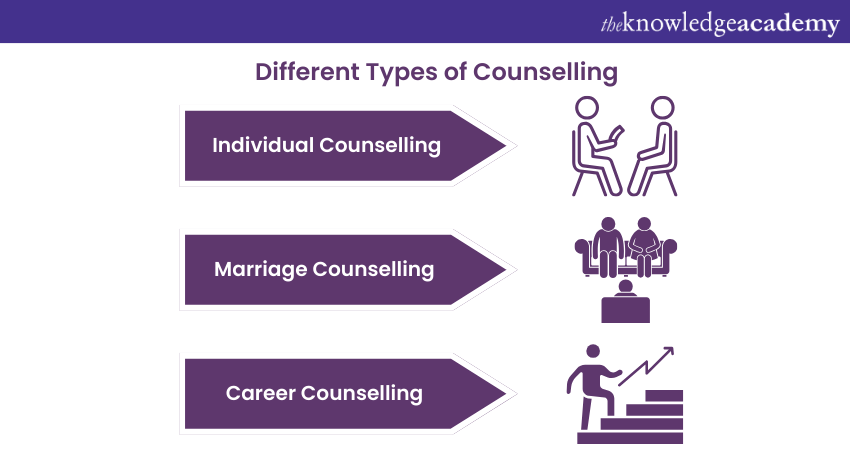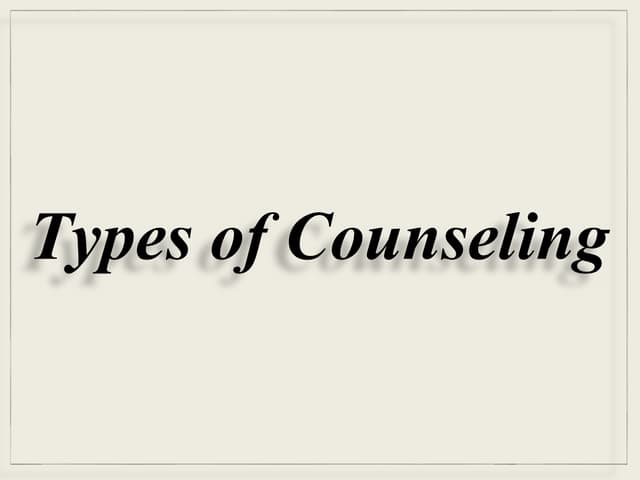adhd counselling support: How It Works with Technology
A Comprehensive Guide to the Numerous Kinds of Counselling and Their Effect
Therapy includes a variety of therapeutic techniques, each made to meet distinct psychological wellness demands. From the organized strategies of Cognitive-Behavioral Treatment to the compassionate nature of Person-Centered Therapy, these modalities offer distinct paths to individual growth. Family treatment and Dialectical Behavior modification provide added structures for healing, while group therapy promotes area assistance. Comprehending these diverse approaches can illuminate their profound influence on private health. What continues to be to be discovered are the intricacies of each approach.

Recognizing Cognitive-Behavioral Therapy (CBT)
Although numerous healing approaches exist, Cognitive-Behavioral Therapy (CBT) sticks out as a result of its organized, ambitious nature. This type of therapy is based on the premise that thoughts, sensations, and behaviors are adjoined, and by transforming unfavorable thought patterns, individuals can modify their emotional reactions and actions. CBT utilizes numerous techniques, such as cognitive restructuring, which helps clients recognize and test distorted beliefs. Behavioral activation encourages involvement in pleasurable tasks to battle anxiety.
Typically, CBT is a short-term treatment, frequently enduring in between 12 to 20 sessions, making it easily accessible for those seeking quick outcomes. Its efficiency has been well-documented in treating anxiousness conditions, anxiety, and other psychological health and wellness problems. The therapist's function is to lead customers through workouts and homework assignments, cultivating self-awareness and promoting lasting coping methods. This useful approach encourages people to take control of their mental health, eventually leading to boosted life complete satisfaction.
Discovering Person-Centered Therapy
Person-Centered Therapy, created by Carl Rogers, uses a different technique to Cognitive-Behavioral Treatment by highlighting the customer's subjective experience. This therapeutic version prioritizes the person's viewpoint, promoting a setting of compassion, unconditional favorable regard, and authenticity. By permitting customers to explore their feelings and ideas without judgment, therapists facilitate individual growth and self-discovery.
The core tenet of Person-Centered Therapy is the idea that individuals have the integral capability for self-healing and personal growth. In this setting, the therapist works as a helpful guide instead of an instruction authority, motivating clients to take cost of their own trip. This technique is particularly reliable for those coming to grips with issues such as reduced self-esteem, anxiousness, or anxiety, as it encourages them to challenge and comprehend their feelings. Eventually, Person-Centered Treatment cultivates a solid therapeutic partnership, fostering trust and openness vital for significant adjustment.
The Duty of Family Members Treatment in Recovery
Family therapy serves as an important component in the healing process for individuals and their relationships. This restorative technique concentrates on enhancing communication, solving problems, and promoting deeper connections among member of the family. By attending to inefficient characteristics, household therapy encourages each member to share their ideas and feelings in a secure setting, advertising understanding and empathy.

The effect of household treatment prolongs past the sessions, as enhanced connections can bring about boosted psychological well-being for all included. Overall, family treatment plays a vital duty in recovery by cultivating unity, resilience, and common assistance amongst household participants, eventually assisting them toward a healthier, more satisfying life together.
Unboxing Dialectical Behavior Modification (DBT)
Structure on the structure of therapeutic strategies that enhance emotional well-being, Dialectical Behavior modification (DBT) provides a structured structure for people having problem with extreme emotions and behavioral challenges. Established by Marsha Linehan, DBT integrates cognitive-behavioral methods with mindfulness techniques, intending to help customers take care of overwhelming sensations and improve social performance.
The treatment is particularly advantageous for those diagnosed with Borderline Individuality Condition but is also suitable to a variety of other psychological health and wellness concerns. relationship therapy. DBT consists of individual therapy sessions and skills training groups, concentrating on four vital ability: mindfulness, distress tolerance, emotion policy, and interpersonal effectiveness
The Benefits of Group Coaching Procedure
While individual treatment gives important understandings, team counseling sessions provide distinct benefits that can significantly enhance the therapeutic experience. One vital benefit is the feeling of neighborhood that emerges amongst individuals. Individuals typically find convenience in sharing their experiences with others encountering comparable difficulties, promoting an encouraging setting that reduces feelings of seclusion.
Team sessions urge diverse perspectives, enabling individuals to find out from each various other's coping strategies and insights. This collective knowledge can bring about boosted problem-solving abilities and a wider understanding of individual problems.
In addition, team therapy commonly promotes responsibility, as members inspire one another to seek their goals and follow their dedications. Lastly, the cost-effectiveness of team therapy makes it an accessible choice for many people seeking support. In general, the collaborative nature of team counseling sessions can significantly enrich the restorative journey.
Frequently Asked Questions
What Qualifications Do Specialists Required to Exercise Therapy?
Specialists generally require a pertinent level in psychology or counseling, together with supervised clinical experience. In addition, they need to get suitable licensure or accreditation to exercise legitimately, ensuring adherence to more info expert criteria and moral standards.
Just how Do I Pick the Right Kind of Therapy for Me?
Choosing the appropriate kind of therapy entails assessing personal demands, checking out numerous techniques, thinking about therapist specializeds, and seeking referrals. Comprehending specific goals and choices can greatly enhance the effectiveness and complete satisfaction of the healing experience.

Are Online Counseling Sessions as Effective as In-Person Ones?
The efficiency of on the internet therapy sessions contrasted to in-person ones usually depends on individual preferences and situations. Research study suggests that both techniques can produce positive results, though some may discover higher comfort in face-to-face interactions.
Exactly How Long Does Counseling Usually Last?

What Should I Expect During My Initial Therapy Session?
During the initial therapy session, customers can anticipate an introduction, conversation of their concerns, establishment of objectives, and a review of the therapy process - relationship therapy. This first conference aims to build rapport and assurance comfort